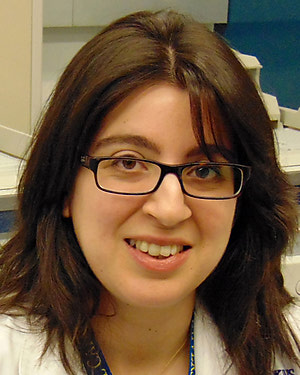Research Lab Results
-
Minimally Invasive Neurosurgery Lab
Directed by Alan R. Cohen, M.D., Carson-Spiro Professor of Neurosurgery, Oncology and Pediatrics, the laboratory is focused on developing novel instruments and approaches to enhance the safety and efficacy of neurosurgical procedures. Current investigations include work in microsurgery, endoscopy, image guidance and robotic surgery. A cadaveric skills lab offers training in neurosurgical techniques. -
Mitzner Laboratory
The Mitzner Laboratory studies the physiologic and pathologic basis of lung health and diseases such as emphysema and asthma. We are currently researching why chronic changes in the lung remain for long periods after initial insults have disappeared. Using phenotyping in whole animal models alongside the assessment of the immunologic status of cells and interactive signaling, we examine lung-tissue damage that creates a chronic immunologic response. -
Mohamed Atta Lab
Dr. Atta and his research team explore the epidemiological and clinical interventions of a variety of kidney diseases. Our goal is not only to advance the understanding of many kidney diseases but also to capitalize on novel discoveries of basic science to treat a wide range of rare and common kidney disorders.
- Multi-international observational study of a rare form of amyloid (LECT2 amyloid) to understand its natural history with the ultimate interest of treating this condition.
- Our group has launched a project investigating the impact of COVID19 on the kidney to identify risk factors influencing outcome across different clinical phenotypes
- In collaboration with the Division of Infectious Diseases and the School of Public Health, our research has focused on the epidemiology of HIV and kidney disease. We also study clinical markers and contributing factors in the progression of kidney disease, and the association between kidney disease and heart disease.
- Our research group is participating in a multicenter consortium serving as a clinical core site to study the pathogenesis of HIV-associated kidney disease by providing well-characterized clinical specimens and corresponding clinical and laboratory data.

-
Mohamed Farah Lab
The Mohamed Farah Lab studies axonal regeneration in the peripheral nervous system. We've found that genetic deletion and pharmacological inhibition of beta-amyloid cleaving enzyme (BACE1) markedly accelerate axonal regeneration in the injured peripheral nerves of mice. We postulate that accelerated nerve regeneration is due to blockade of BACE1 cleavage of two different BACE1 substrates. The two candidate substrates are the amyloid precursor protein (APP) in axons and tumor necrosis factor receptor 1 (TNFR1) on macrophages, which infiltrate injured nerves and clear the inhibitory myelin debris. In the coming years, we will systematically explore genetic manipulations of these two substrates in regard to accelerated axonal regeneration and rapid myelin debris removal seen in BACE1 KO mice. We also study axonal sprouting and regeneration in motor neuron disease models. -
Molecular Genetics Laboratory of Female Reproductive Cancer
The long-term objectives of our research team are: a. to understand the molecular etiology in the development of human cancer, and b. to identify and characterize cancer molecules for cancer detection, diagnosis, and therapy. We use ovarian carcinoma as a disease model because it is one of the most aggressive neoplastic diseases in women. For the first research direction, we aim to identify and characterize the molecular alterations during initiation and progression of ovarian carcinomas. -
Molecular Mechanisms of Cellular Mechanosensing (Robinson Lab)
The Robinson Lab studies the way in which mechanical stress guide and direct the behavior of cells, including when they are part of tissues, organs and organ systems. -
Molecular Oncology Laboratory
Our Molecular Oncology lab seeks to understand the genomic wiring of response and resistance to immunotherapy through integrative genomic, transcriptomic, single-cell and liquid biopsy analyses of tumor and immune evolution. Through comprehensive exome-wide sequence and genome-wide structural genomic analyses we have discovered that tumor cells evade immune surveillance by elimination of immunogenic mutations and associated neoantigens through chromosomal deletions. Additionally, we have developed non-invasive molecular platforms that incorporate ultra-sensitive measurements of circulating cell-free tumor DNA (ctDNA) to assess clonal dynamics during immunotherapy. These approaches have revealed distinct dynamic ctDNA and T cell repertoire patterns of clinical response and resistance that are superior to radiographic response assessments. Our work has provided the foundation for a molecular response-adaptive clinical trial, where therapeutic decisions are made not based on imaging but based on molecular responses derived from liquid biopsies. Overall, our group focuses on studying the temporal and spatial order of the metastatic and immune cascade under the selective pressure of immune checkpoint blockade with the ultimate goal to translate this knowledge into “next-generation” clinical trials and change the way oncologists select patients for immunotherapy.
-
Mollie Meffert Lab
The Mollie Meffert Lab studies mechanisms underlying enduring changes in brain function. We are interested in understanding how programs of gene expression are coordinated and maintained to produce changes in synaptic, neuronal and cognitive function. Rather than concentrating on single genes, our research is particularly focused on understanding the upstream processes that allow neuronal stimuli to synchronously orchestrate both up and down-regulation of the many genes required to mediate changes in growth and excitation. This process of gene target specificity is implicit to the appropriate production of gene expression programs that control lasting alterations in brain function. -
Motion Analysis Laboratory
Our team is focused on understanding how complex movements are normally learned and controlled, and how damage to specific brain areas impairs these processes. We employ several techniques to quantify movement including: 3-dimensional tracking and reconstruction of movement, recordings of muscle activity, force plate recordings, and calculation of joint forces and torques. These techniques allow for very precise measurements of many different types of movements including: walking, reaching, leg movements, hand movements and standing balance. All studies are designed to test specific hypotheses about the function of different brain areas, the cause of specific impairments and/or the effects of different interventions. -
Mouen Khashab Lab
The Mouen Khashab Lab performs clinical research on spasmatic esophageal disorders and endoscopic myotomy.






